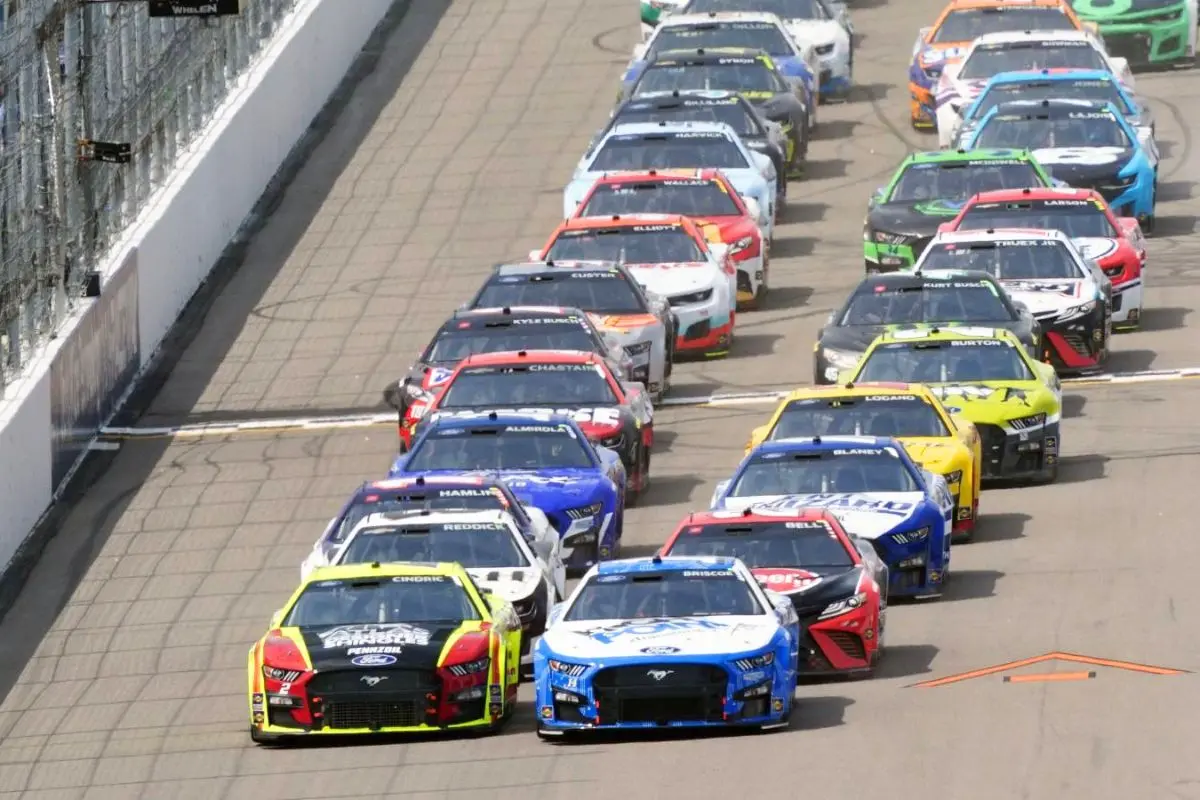Fans are urging NASCAR to adopt strategies similar to those implemented by Formula 1 under Stefano Domenicali. This includes exploring shorter race formats and increased innovation to capture younger audiences. NASCAR’s recent changes have expanded its calendar and diversified its tracks, but struggles persist despite these adaptations. Critics in both sports express concerns about altering traditional formats, emphasizing the importance of race quality over length. More on the implications of these shifts can be uncovered in the ongoing discourse.
Key Takeaways
- Fans are advocating for NASCAR to implement shorter race formats similar to F1 to attract younger audiences and improve engagement.
- NASCAR’s recent changes, including reduced practice sessions and single-round qualifying, reflect a willingness to innovate like F1.
- The introduction of more diverse track types in NASCAR aims to broaden its appeal, mirroring F1’s race calendar expansion.
- Critics of NASCAR’s current strategies highlight the importance of maintaining traditional elements while seeking innovation, as seen in F1’s evolution.
- Many fans believe enhancing race quality, rather than just shortening duration, is key to improving viewer experience and attendance in both series.
Domenicali’s leadership and proposed changes
As Formula 1 navigates the changing landscape of motorsport under Stefano Domenicali’s leadership, the CEO’s proposed alterations reflect a tactical response to evolving audience preferences.
The expansion of the race calendar and the introduction of sprint racing in 2021 signify a commitment to innovation. Currently, Domenicali is considering reducing race lengths to engage a younger demographic with shorter attention spans.
This potential shift has sparked mixed reactions; while some traditional fans express skepticism, a majority of stakeholders, including drivers, appear supportive.
This divergence highlights the delicate balance between preserving the sport’s heritage and adapting to contemporary viewing habits.
Ultimately, Domenicali’s initiatives aim to boost F1’s appeal and guarantee its relevance in a competitive sports landscape.

Comparison to NASCAR’s changes
While Formula 1 investigates groundbreaking strategies to attract a younger audience, NASCAR has also undergone considerable transformations to adapt to the evolving landscape of motorsport.
Importantly, the COVID-19 pandemic prompted NASCAR to revise its operational format, leading to reduced practice sessions, allowing drivers only 25 minutes to familiarize themselves with tracks.
Moreover, the introduction of single-round qualifying for most tracks, along with distinct formats for short and road courses, marks a major shift in how grid positions are determined.
In addition, NASCAR’s calendar has diversified, incorporating more road courses and street tracks, reflecting an effort to broaden its appeal.
These changes demonstrate NASCAR’s commitment to innovation, aligning its strategies with the demands of a modern racing audience.
Domenicali’s defense of the new format
Stefano Domenicali, the CEO of Formula 1, passionately advocates for a shift in race formats to engage a younger audience and improve the general spectator experience. He emphasizes the need to shorten race lengths, noting that current durations may deter younger viewers.
Highlighting the popularity of race highlights, he asserts that sprint weekends garner broad support from both promoters and drivers, marking an important cultural shift within the sport. Initially met with resistance, drivers now favor the sprint format, reflecting a collective desire for increased action over extended practice sessions.
Domenicali’s strategy aims not only to captivate television audiences but also to boost ticket sales, ensuring fans remain invested throughout the race weekend. Therefore, he champions innovation as crucial for F1’s evolution.
Are F1 races too long? 🤔
Stefano Domenicali believes it may be putting younger fans off the sport… pic.twitter.com/QyGXvZoj8o
— Autosport (@autosport) September 3, 2025
NASCAR’s struggles as a cautionary tale
NASCAR serves as a cautionary tale for motorsport series considering similar format changes. The reduction of practice sessions has not yielded the anticipated benefits, leading to declining television viewership and ticket sales.
Longtime fans express nostalgia for the days when they could witness drivers honing their skills on the track. The shift toward simulators has alienated many supporters, diminishing the appeal of live practice and increasing costs for spectators.
Moreover, shortening race lengths has provoked considerable backlash, with fans voicing their discontent across social media platforms.
These developments highlight the risks associated with altering traditional formats, emphasizing the importance of maintaining fan engagement and preserving the essence of the sport amidst attempts at modernization.
 NASCAR Cup Series Owner Standings” width=”1200″ height=”800″ srcset=”https://slicksandsticks.com/wp-content/uploads/2025/03/NASCAR-Cup-Series-Owner-Standings-1.webp 1200w, https://slicksandsticks.com/wp-content/uploads/2025/03/NASCAR-Cup-Series-Owner-Standings-1-300×200.webp 300w, https://slicksandsticks.com/wp-content/uploads/2025/03/NASCAR-Cup-Series-Owner-Standings-1-1024×683.webp 1024w, https://slicksandsticks.com/wp-content/uploads/2025/03/NASCAR-Cup-Series-Owner-Standings-1-768×512.webp 768w, https://slicksandsticks.com/wp-content/uploads/2025/03/NASCAR-Cup-Series-Owner-Standings-1-630×420.webp 630w, https://slicksandsticks.com/wp-content/uploads/2025/03/NASCAR-Cup-Series-Owner-Standings-1-150×100.webp 150w, https://slicksandsticks.com/wp-content/uploads/2025/03/NASCAR-Cup-Series-Owner-Standings-1-696×464.webp 696w, https://slicksandsticks.com/wp-content/uploads/2025/03/NASCAR-Cup-Series-Owner-Standings-1-1068×712.webp 1068w” sizes=”auto, (max-width: 1200px) 100vw, 1200px” />
NASCAR Cup Series Owner Standings” width=”1200″ height=”800″ srcset=”https://slicksandsticks.com/wp-content/uploads/2025/03/NASCAR-Cup-Series-Owner-Standings-1.webp 1200w, https://slicksandsticks.com/wp-content/uploads/2025/03/NASCAR-Cup-Series-Owner-Standings-1-300×200.webp 300w, https://slicksandsticks.com/wp-content/uploads/2025/03/NASCAR-Cup-Series-Owner-Standings-1-1024×683.webp 1024w, https://slicksandsticks.com/wp-content/uploads/2025/03/NASCAR-Cup-Series-Owner-Standings-1-768×512.webp 768w, https://slicksandsticks.com/wp-content/uploads/2025/03/NASCAR-Cup-Series-Owner-Standings-1-630×420.webp 630w, https://slicksandsticks.com/wp-content/uploads/2025/03/NASCAR-Cup-Series-Owner-Standings-1-150×100.webp 150w, https://slicksandsticks.com/wp-content/uploads/2025/03/NASCAR-Cup-Series-Owner-Standings-1-696×464.webp 696w, https://slicksandsticks.com/wp-content/uploads/2025/03/NASCAR-Cup-Series-Owner-Standings-1-1068×712.webp 1068w” sizes=”auto, (max-width: 1200px) 100vw, 1200px” />
Fans’ backlash to Domenicali’s opinion
Discontent among motorsports fans has erupted in response to Stefano Domenicali’s assertion that Formula 1 races are “too long” for younger audiences.
Many fans expressed confusion, arguing that a race duration of approximately 90 minutes is standard compared to other sports. Critics assert that the true issue lies not in the race length but in the perceived quality of on-track action, with some suggesting that NASCAR’s longer races attract younger viewers due to their excitement.
Moreover, fans emphasize that highlights are readily available, making Domenicali’s reasoning for reducing race length seem flawed.
For longstanding enthusiasts, the notion of altering the race format to cater to a younger demographic undermines the sport’s heritage and prestige, sparking further backlash.

News In Brief: Fans Demand NASCAR Adopts F1 Playbook as Official Teases Big Changes
As fans rally for NASCAR to adopt the groundbreaking strategies of Formula 1, the tension between tradition and evolution becomes tangible. Domenicali’s leadership and proposed changes serve as a bold attempt to energize the sport, yet they also evoke skepticism from those wary of NASCAR’s recent struggles. The backlash from fans emphasizes a critical dialogue within motorsports about the balance between change and identity, highlighting the need for careful consideration of what truly improves the spectator experience.
ALSO READ: NASCAR Fans Weigh In on Darlington’s Southern 500
